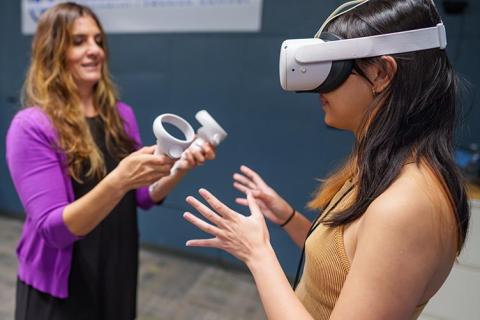
The UNH Immersive Technology Hub is designed for students, faculty, staff, and community partners to harness the power of various semi-immersive or fully immersive technologies. This joint initiative between the Health Sciences Simulation Center (HSSC) and the Center for Digital Health Innovation (CDHI) provides a collaborative environment where faculty, students, and staff can delve into the therapeutic applications of immersive technologies with clients.
From wearables with immersive technology capabilities to virtual, extended, augmented, and mixed reality technologies, the hub serves as gathering point for research, teaching, and learning within the healthcare landscape.
CDHI will host a Virtual Simulation with your organization! Depending on your organization’s needs, we will design a VR simulation for your healthcare team. Contact us to learn more about our offerings.
Student and Professional Learning Opportunities
Immersive Technology Hub

Our Immersive Technology Hub has in-house equipment and training for the use of immersive technology for both therapeutic use and simulations for learning. Students are able to utilize equipment designed to address various conditions such as physical, cognitive, or stroke rehabilitation. Immersive technology also enhances experiential learning by simulating clinical scenarios across diverse environments, including hospitals, clinics, communities, and homes. The interdisciplinary nature of immersive technology enables UNH classrooms to address social, emotional, and behavioral health needs by simulating scenarios involving multiple disciplines.
Community Initiatives
Distance Learning and Telemedicine Project

Our Immersive Technology Hub has in-house equipment and training for the use of immersive technology for both therapeutic use and simulations for learning. Students are able to utilize equipment designed to address various conditions such as physical, cognitive, or stroke rehabilitation. Immersive technology also enhances experiential learning by simulating clinical scenarios across diverse environments, including hospitals, clinics, communities, and homes. The interdisciplinary nature of immersive technology enables UNH classrooms to address social, emotional, and behavioral health needs by simulating scenarios involving multiple disciplines. Funded by the USDA Distance Telemedicine Grant.
Research
Research and Immersive Technologies
Faculty and staff are engaged in various research studies involving immersive technologies. Below are some examples.
Medication Quick Response (QR)
Using the Medication Quick Response (QR), assistant clinical professors Anne Meginniss MSN, FNP-BC and Courtney Coffey DNP, CNW from the School of Nursing in collaboration with Kristen Clark PhD began using QR codes in their simulation labs. They are measuring the efficacy of Medication QRs for medication administration. Medication administration poses unique challenges in vulnerable populations such as pediatrics. Errors can occur at multiple points along the care continuum. Read their article here.
- Medication administration is core to the nursing role. Executing this skill safely is a large focus in undergraduate nursing programs. Students who participated in medication administration simulation committed significantly less medication errors in the clinical setting than those who did not participate in simulation (Jarvill et al., 2018).
- Reducing medication errors in the clinical setting is multi-factorial.
- The Medication Quick Response (QR) code scanning is a non-patented, augmented reality, low-cost method to replicate barcode scanning in the simulation setting. QR codes have been proven to be a valuable resource in education. This learning medium reduces the split-attention effect for some learners and can offer a method to link material to scenarios thus decreasing the learners’ cognitive load (Karia et al., 2019). QR codes can add realism to laboratory settings (Shustack, 2018).
REDUCING STRESS AND ANXIETY
To assist nursing students with the typical stress and anxiety they experience before and during a simulation, faculty are researching the use of VR meditations prior to a simulation experience.
Zen Den
The CDHI is partnering with Mass General in Dover, NH to provide virtual meditation onsite in their “Zen Den.” The Zen Den is designed to assist health workers in decompressing from the day to day (and sometimes traumatic) stress of working in a hospital setting. We are working with the research team at Mass General in Dover to study the efficacy of virtual meditation to reduce stress in the hospital environment.
See our “people” page to learn about more research in this area.